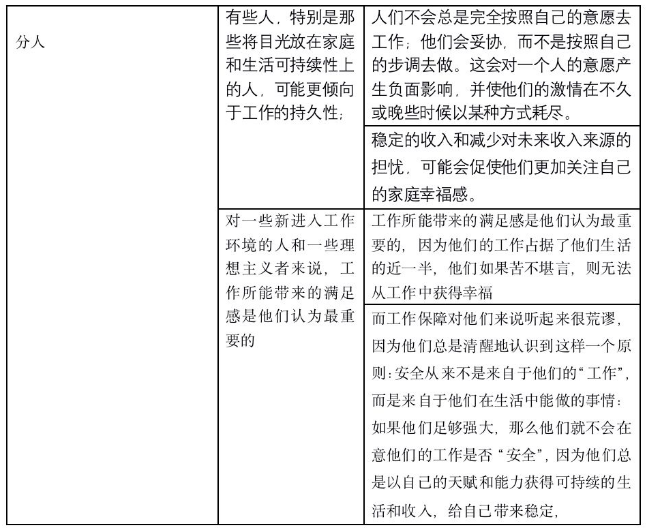Some people believe that job satisfaction is more important than job security. Others believe that people cannot always enjoy their jobs and that a permanent job is more important.
Discuss both views and give your opinion.
题目大意
有些人认为工作满意度比工作保障更重要。另一些人认为,人们不可能总是喜欢自己的工作,而一份永久性的工作更为重要。讨论两种观点并给出你的意见。
写作思路解析
分人
1. 有些人,特别是那些将目光放在家庭和生活可持续性上的人,可能更倾向于工作的持久性;他们把持久性列在工作清单的首位,因为他们认为自己对职业道路的感情可能永远不会长久,但稳定的工作生活所带来的东西可能会给他们带来即使退休后也能保持的稳定生活。“工作”的概念从来没有只包括幸福,因为一个人的所有工作内容是被签订在合同上的,在合同中,应承担责任,以满足权威或其他人的要求。这意味着,可悲的是,人们不会总是完全按照自己的意愿去工作;他们会妥协,而不是按照自己的步调去做。这会对一个人的意愿产生负面影响,并使他们的激情在不久或晚些时候以某种方式耗尽。相反,随着年龄的增长,人们会更多地考虑他们的生活,而不是他们的职业,可能会更关心他们是什么样的人,他们有能力用他们从工作中获得的收入对自己或家人做些什么;这种心态是追求工作持久性的原因,因为稳定的收入和减少对未来收入来源的担忧,可能会促使他们更加关注自己的家庭幸福感。
2. 但这并不是社会上唯一存在的心态,仍有人将工作满意度列为职业生涯的首位。对一些新进入工作环境的人和一些理想主义者来说,工作所能带来的满足感是他们认为重要的,因为他们的工作占据了他们生活的近一半,他们如果苦不堪言,则无法从工作中获得幸福,但“工作保障”在当他们对自己有信心的时候便听来无聊。首先,他们可能对自己能做什么和不能做什么怀有激情,并且总是怀着在自己热爱的领域提高自己能力的雄心;他们认为自己工作的方式可能会在职业生涯中产生一种可持续的生活习惯,他们在那一天画出了美丽的蓝图,他们可能从所有的同事和竞争对手那里获得全面的认可。而工作保障对他们来说听起来很荒谬,因为他们总是清醒地认识到这样一个原则:安全从来不是来自于他们的“工作”,而是来自于他们在生活中能做的事情:如果他们足够强大,那么他们就不会在意他们的工作是否“安全”,因为他们总是以自己的天赋和能力获得可持续的生活和收入,给自己带来稳定,而所有这些信心都来自于他们激情和对“满意”工作的投入,在这份工作中,他们更可能因为永恒的感情而获得成功。
提纲梳理见下
写作示范
The seemingly contrary views towards job satisfaction and sustainability would be both persuasive when different personalities are included in the discussion.
There are people, especially for those who would put their eyes on their family and living sustainability may show their greater preference to job permanency; they consider this property more important than other elements, since they think their affection to their career path may never last long, but what is brought by their stable working life may give their stability even after their retirement. The concept of “job” has never included only happiness, since what one can or cannot do during their working hours are signed on a contract, in which responsibility should be taken in order to fulfil what the authority or others demand for. That means, sadly, one would not always do exactly as he or she wants mostly; they would compromise more than follow their own paces. This negatively affects one’s willingness, and makes their passions somehow exhausted soon or later. Conversely, as the age grows, one would largely consider more about their life apart from their vocations, and may care more about what they are with the capability of doing to their own, or their family with what they have earned from their jobs; this mentality is what the chase for work permanency comes about, since a stable income and a less worry about their future source of income may prompt them to pay attention to themselves-family happiness, well-beings, or physical welfare, etc.-but not to share consciousness on their working life.
But this is not the solely existed psychology of the society; there are still people ranking job satisfaction the top of their vocational lifespan. To some who are newly put into the working environment, and some idealists, the fulfillment that can be gained from jobs is on the top of their lists, because their jobs occupy nearly a half of their lives, and it may be with bitterness that they cannot harvest happiness from what they get involve in, but “job security” would sound somewhat dull when they are confident of themselves. They may, firstly, harbor the passions on what they can do and cannot do, and always with the ambitions on improving their abilities in the arena of what they are passionate with; they consider the working mode of their jobs may give rise to a sustainable living habit in their careers, and they draw their blueprint beautifully that one day, they may earn an overall recognition from all the colleagues and rivals. Whereas the job security sounds ridiculous to them, because they are always sober for the principle that security never comes from their “jobs”, but from what they can do in their life: if they are enough powerful, then they wouldn’t care about whether their jobs are “secure” or not, because they will always bring themselves stabilities to gain sustainable life and incomes with their own giftedness and capabilities, and all that confidence comes from their initial passions and devotions to a “satisfied” job, in which they are more likely to be successful due to their everlasting affections.
In conclusion, to choose what kind of job may be largely decided by what kind of person one is; the rationality of the both job options may be linked with whether one is paying attention to the practical benefits of a job, or the deepened impacts a job may have on one’s future life paces.


